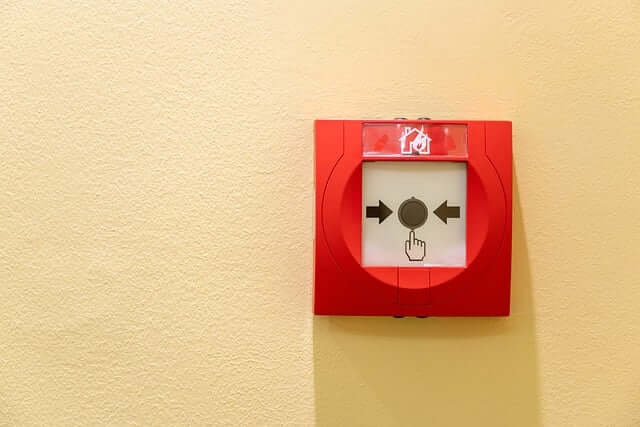
Installing a fire alarm is a great way of keeping the occupants of your home or business premises safe from fire. The question is, where should you put it? Read on to find out.
Fire Alarms at Home
Although it is not illegal to live without a fire alarm in your home, it’s much safer to have one installed. You may even get a discount on your home insurance for doing so. How should you install a fire alarm system for maximum protective benefits?
Within your home, it’s best to install a smoke alarm on every floor of the home, and a heat alarm in your kitchen. Current British Standards Institution guidelines recommend that smoke and heat alarms be installed:
- As close to the centre of the ceiling as possible
- 300mm from walls and light fittings
- Within 3m of every escape door and bedroom door to ensure it can be heard by as many people as possible
- Smoke alarms should also be positioned between the high-risk rooms and the bedrooms, while heat alarms should sit within high-risk rooms such as the kitchen or loft.
Smoke alarms should not be installed in the kitchen because they can be set off by cooking fumes – and false alarms can lead to penalties. Heat alarms are therefore better for kitchens.
Fire Alarms in Commercial Properties
Almost all non-domestic premises, including schools, need to have fire alarms installed. If your office consists of a single room, you may not need a fire alarm, but otherwise having one installed is a legal requirement. You can test the need for one by shouting “Fire!” and if it cannot be heard through the office if doors are closed, then you’ll need a fire alarm.
The type of fire alarm you have installed will depend on your business needs, but there are a couple of types you could have:
- Conventional fire alarms – suitable for small or low-risk environments, conventional alarms divide premises into broad zones and identify the zone if a fire breaks out
- Addressable fire alarms – each alarm has a unique electronic address that helps identify the precise location of the fire, suitable mainly for large or high-risk environments like schools and hospitals
Regardless of the type of alarm you have installed, it will be subject to particular requirements:
- Can it detect fires easily?
- It must be checked regularly
- It must be serviced regularly
Detection equipment must be installed on the ceiling either in every room, or on every storey of the property, depending on the type of property and the business activities. Any enclosed area needs a smoke detector – so if you have an office kitchen, or a separate room partitioned off within an open-plan office, they would need smoke detectors.
You will also need to install the right grade of fire alarm for your premises. There are six grades of fire alarm: A, C, D1, D2, F1, and F2. A is the highest, F2 is the lowest. Most residential buildings will be fine with a lower grade of alarm. Commercial properties or those at higher risk of fire will need a higher grade.
*
Here at IDS Security Ltd, we cover all categories of fire detection systems, and we offer bespoke installation services following a survey of your premises. If you choose to take out our maintenance contract, we will also monitor your alarms 24/7 and visit your premises if anything goes wrong with the alarm. The monitoring service also includes alerting the fire service if an alarm goes off.
If you have any questions about our services, don’t hesitate to get in touch.
FIRE ALARM SYSTEMS GET A QUOTE